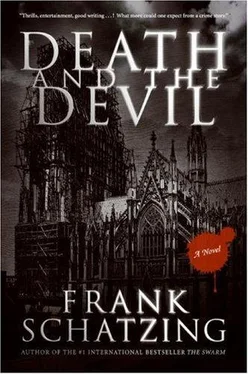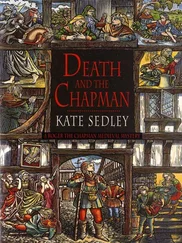He backed up his prayer with a vigorous nod and set off again.
Jacob stopped. He was looking up at the sky, obviously filled with reverence.
“What is it now?” asked Jaspar impatiently.
Jacob started. “I thought—”
“Forget it. Don’t stand around. God’s a very busy man.”
The first people were beginning to appear in the streets, on their way to church. Nobody paid any attention to them, though Jaspar felt the way they were constantly craning their necks must make them extremely conspicuous.
With every step his hopes fell. Urquhart could be anywhere. They were behaving like children. If they did find him, then his second visit to Hieronymus would perhaps have been worthwhile. Perhaps—assuming, that is, Hieronymus hadn’t simply made it all up.
But Urquhart would make sure he couldn’t be found.
After a while the palace appeared in front of them again.
“Wait.”
Massaging the bridge of his nose, Jaspar turned toward Jacob. “You think they might recognize you?”
“Possibly.”
“I imagine they’ll hardly expect you to turn up here again. Remember, you’re just a monk, one of thousands. A monk has no face.”
Jacob looked dubious. “You might know that, but”—he pointed at the palace—“do they?”
“You’d rather go back?”
“No,” said Jacob irascibly, stepping past Jaspar out into Am Hof. Diagonally opposite was the tree through the branches of which he had come crashing down.
“Slowly,” hissed Jaspar. He took Jacob’s arm and drew him past the palace up toward Pfaffenstraße. They saw priests, bishops, and monks from various orders gathering in a long procession outside the cathedral cloisters. Novices were dashing to and fro, bringing crucifixes and reliquaries. Jaspar could see the top of a tall, wide baldachin. Presumably Conrad would be riding underneath it. The archbishop was not keen on going on foot.
Suddenly Jaspar had misgivings. The baldachin was huge. It would hide Conrad completely. How could Urquhart even see his target from an elevated standpoint, never mind hit it?
Or did Urquhart have something else in mind?
“But what?” he muttered to himself.
Then he had an idea, an idea that made him abandon caution and hurry along the street.
Jacob would have preferred to stride out as he followed the route of the procession, but Jaspar was right. As long as they were within the palace, it was best to remain as inconspicuous as possible. And most inconspicuous of all was a monk plodding slowly past.
He was starting to get hot under his habit. It couldn’t be the weather. Was it fear making him sweat?
Pull yourself together, he told himself. You’ve been through worse than this.
His eye was caught by the gathering in front. Patches of purple, blue, and gold were picked out by the dawn light. A group of riders appeared from behind the provost’s house, impressive in their gleaming armor, which shone like molten pewter in the first light of morning. For a brief moment they parted and Jacob saw another figure on horseback: slim, stiffly upright in the saddle, with a sharp, clean-shaven profile and curly gray hair. Then he was gone and a baldachin was raised. He heard the faint sound of music. The great processions were always preceded by an organ on a cart.
Jacob had seen many of these processions and the music always reminded him of the marvelous ships that had sailed across the land in honor of the fair Isabella. He felt a brief stab of melancholy.
Another time. Another man.
Jacob suddenly realized he was dog weary. It was the weariness that comes from not knowing what to do. What did they hope to achieve? Ridiculous, looking at all the houses, as if Urquhart would be leaning out of the window to give them a friendly wave. Here I am, look, up here. Great you could make it. Come up and stop me from murdering Conrad.
Too many streets. Too many buildings. If Urquhart had survived the fire in anything like one piece, the archbishop would die. They couldn’t stop the murderer carrying out his commission because they couldn’t find him.
He looked over at the cathedral. That was where everything had started. With a few apples. Damn the apples. They’d caused nothing but trouble since Adam and Eve.
As he surveyed the forest of spars forming the scaffolding, in his mind’s eye he saw again Gerhard walking along, on the top level, and then Urquhart’s black shadow—
The Shadow.
Bewildered, Jacob screwed up his eyes and looked again. For a moment it had seemed as if history were repeating itself. But that was nonsense. Nothing about the building was different from usual.
He looked away and turned his attention back to the procession.
At that moment Jaspar muttered something incomprehensible and dashed off. Jacob stared at him, openmouthed, swore softly, and hurried after him.
“Jaspar,” he hissed.
The dean didn’t hear. He had obviously discovered something that made him ignore his own advice. He was heading straight for the procession.
“Jas—”
The bells rang out. At once the procession began to move. Jacob ran on for a few more steps, then stopped. Jaspar had vanished among the people standing around. He probably assumed Jacob was following him.
But something rooted Jacob to the spot and forced him to turn around to look at the cathedral again.
It was the same as ever. There was nothing out of the ordinary about it. Nothing at all. The light-colored stone of the chancel. The scaffolding. No one on it. Of course not, it was too early. And, anyway, it was Sunday. Nobody would be up there today.
The sound of a hymn came from the procession, but Jacob wasn’t listening. A feeling of apprehension had taken hold of him. What was wrong with the church?
Gerhard on the scaffolding. Then suddenly the Shadow. The Shadow that had appeared out of nowhere. But the Shadow had not been the Devil, it had been Urquhart, and he was a man.
Out of nowhere—
A man did not appear out of nowhere.
Undecided about what to do, Jacob looked across at the procession, trying to find Jaspar, but he had vanished. More and more people were coming out of the nearby houses, gentlemen and their wives, many in fine clothes, while others came riding up singly or in small groups to follow the procession. There were simple tradesmen there as well, maids and servants, pilgrims and peasants who had arrived in the city the previous day to take part in the celebration, sick people, layabouts, beggars, everyone.
Jacob walked slowly back past the palace, continuing until he was almost at the river, then turned left. A few steps took him to the Franks Tower, where suspects were questioned under torture and criminals handed over to the warden of the archbishop’s palace.
He was to the east of the cathedral, separated from it by a large square and the smaller church of St. Mary’s-on-the-Steps. Again he looked up and studied the mighty facade with its incredibly high, slender windows. He could get there from the Franks Tower without having to pass through a gate with guards.
As he crossed the square, walking at an unhurried pace, apparently deep in prayer, he suddenly knew where the Shadow had appeared from.
All at once he knew.
All at once he knew.
He had hurried along behind the procession because he had suddenly had the idea Urquhart might have joined it, disguised as a priest, a monk, or even a horseman in armor. His progress was followed by irritated glances from those who had felt the sharpness of his elbow as he quickly made his way through the singing and praying throng. Some way ahead of him Conrad was riding underneath the baldachin, two men in armor behind, beside, and before him. His hair fluttered in the wind. His lively, bright blue eyes surmounted a nose which gave him something of the animal dignity of a falcon. The archbishop was neither tall nor strongly built, but he had a presence that dominated everything and everyone.
Читать дальше












